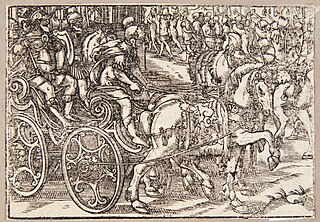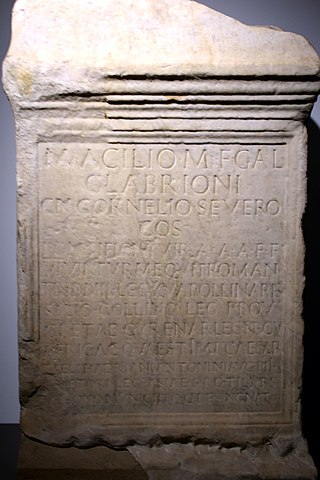Related Research Articles
The gens Acilia was a plebeian family at ancient Rome, that flourished from the middle of the third century BC until at least the fifth century AD, a period of seven hundred years. The first of the gens to achieve prominence was Gaius Acilius, who was quaestor in 203 and tribune of the plebs in 197 BC.
Manius Acilius Glabrio was a Roman statesman and general, grandson of the jurist Publius Mucius Scaevola.

The gens Valeria was a patrician family at ancient Rome, prominent from the very beginning of the Republic to the latest period of the Empire. Publius Valerius Poplicola was one of the consuls in 509 BC, the year that saw the overthrow of the Tarquins, and the members of his family were among the most celebrated statesmen and generals at the beginning of the Republic. Over the next ten centuries, few gentes produced as many distinguished men, and at every period the name of Valerius was constantly to be found in the lists of annual magistrates, and held in the highest honour. Several of the emperors claimed descent from the Valerii, whose name they bore as part of their official nomenclature.

Manius Acilius Glabrio was a plebeian Roman politician and general during the Republican. He served as consul in 191 BC while Rome was at war with the Seleucid Empire. He defeated Emperor Antiochus the Great at Thermopylae, helping establish Roman unipolar control over the Mediterranean, and was awarded a triumph. Credible accusations that he had embezzled spoils from his conquests in Greece while consul caused him to withdraw from his attempt to run for censor, after which he largely retired from public life.
Manius Acilius Glabrio was a Roman Senator who served as consul ordinarius in AD 91 as the colleague of Trajan, afterwards emperor. Although one of many senators executed during the reign of Domitian on the alleged grounds of plotting against the emperor, he was remembered by his contemporaries best for his strength. Domitian summoned Glabrio during the latter's consulate to his Alban estate during the festival of the Juvenalia to kill a large lion; not only did Glabrio despatch the beast, but he escaped all injury. Following his defeat of the lion, Glabrio was banished by Domitian, then executed while in exile.
Manius Acilius Glabrio may refer to:
Manius Laberius Maximus was a Roman senator and general, who was active during the reign of Domitian and Trajan. He was twice consul: the first time he was suffect consul in the nundinium of September to December 89 AD as the colleague of Aulus Vicirius Proculus; the second time as ordinary consul in 103 as colleague to the Emperor Trajan.
Marcus Asinius Marcellus was the name of two men of the Asinii.
The gens Otacilia, originally Octacilia, was a plebeian family at ancient Rome. The gens first rose to prominence during the First Punic War, but afterwards lapsed into obscurity. The first of the family to obtain the consulship was Manius Otacilius Crassus, in 263 BC.
Lucius Valerius Claudius Acilius Priscillianus [Maximus] was a Roman senator.

The gens Pomponia was a plebeian family at ancient Rome. Its members appear throughout the history of the Roman Republic, and into imperial times. The first of the gens to achieve prominence was Marcus Pomponius, tribune of the plebs in 449 BC; the first who obtained the consulship was Manius Pomponius Matho in 233 BC.
Marcus Acilius Glabrio was a Roman senator who was appointed consul suffectus in 33 BC.

The Temple of Piety was a Roman temple dedicated to the goddess Pietas, a deified personification of piety. It was erected in 181 BC at the northern end of the Forum Olitorium, the Roman vegetable market, and demolished in 44 BC to make room for the building eventually known as the Theater of Marcellus. It seems to have been rebuilt and its services continued well into the imperial period, although this is disputed by some scholars.

Manius Acilius Glabrio Gnaeus Cornelius Severus was a senator of the Roman Empire. He was consul ordinarius in 152 with Marcus Valerius Homullus as his colleague. Acilius Glabrio is known almost solely from surviving inscriptions.
Manius Acilius Aviola was a senator of the Roman Empire. He was consul ordinarius in AD 54 with Marcus Asinius Marcellus as his colleague. Aviola is also recorded as being governor of Asia in 65/66. According to Brian Jones, Aviola was also curator aquarum from 74 to 97. He is known almost solely from surviving inscriptions.
Acilius Severus was a member of the Roman aristocracy of the fourth century AD. He is known to have been consul with Vettius Rufinus as his colleague, and to have served as urban prefect of Rome.

Lucius Funisulanus Vettonianus was a Roman general and senator during the reigns of the Flavian emperors. He was suffect consul in the nundinium of September to October 78 with Quintus Corellius Rufus as his colleague.
Gaius Calpurnius Acilius Aviola was a senator of the Roman Empire. He was suffect consul in AD 24 with Publius Cornelius Lentulus Scipio as his colleague. Aviola is also recorded as being governor of Asia in 37/38. Aviola has been identified as the father of Manius Acilius Aviola, consul in 54.
Lucius Aurelius Gallus was a Roman senator, who held a series of appointments during the first half of the second century AD. A military diploma found in Morocco attests that he was suffect consul on 18 August for one of the years between 129 and 132 as the colleague of ...cus Priscus. Gallus is known entirely from inscriptions.
Lucius Corellius Neratius Pansa was a Roman senator, who was active during the reign of Hadrian. He was ordinary consul in AD 122 as the colleague of Manius Acilius Aviola. Other than holding the office of consul, Pansa is only known for being the subject of a letter of Pliny the Younger.
References
- ↑ CIL VI, 1159; CIL III, 827
- ↑ Paul Gallivan, "Who Was Acilius?", Historia: Zeitschrift für Alte Geschichte , 27 (1978), p. 624 n. 29
- ↑ Karlheinz Dietz, "Senatus contra principem", Vestiga, 29 (1980) p. 39